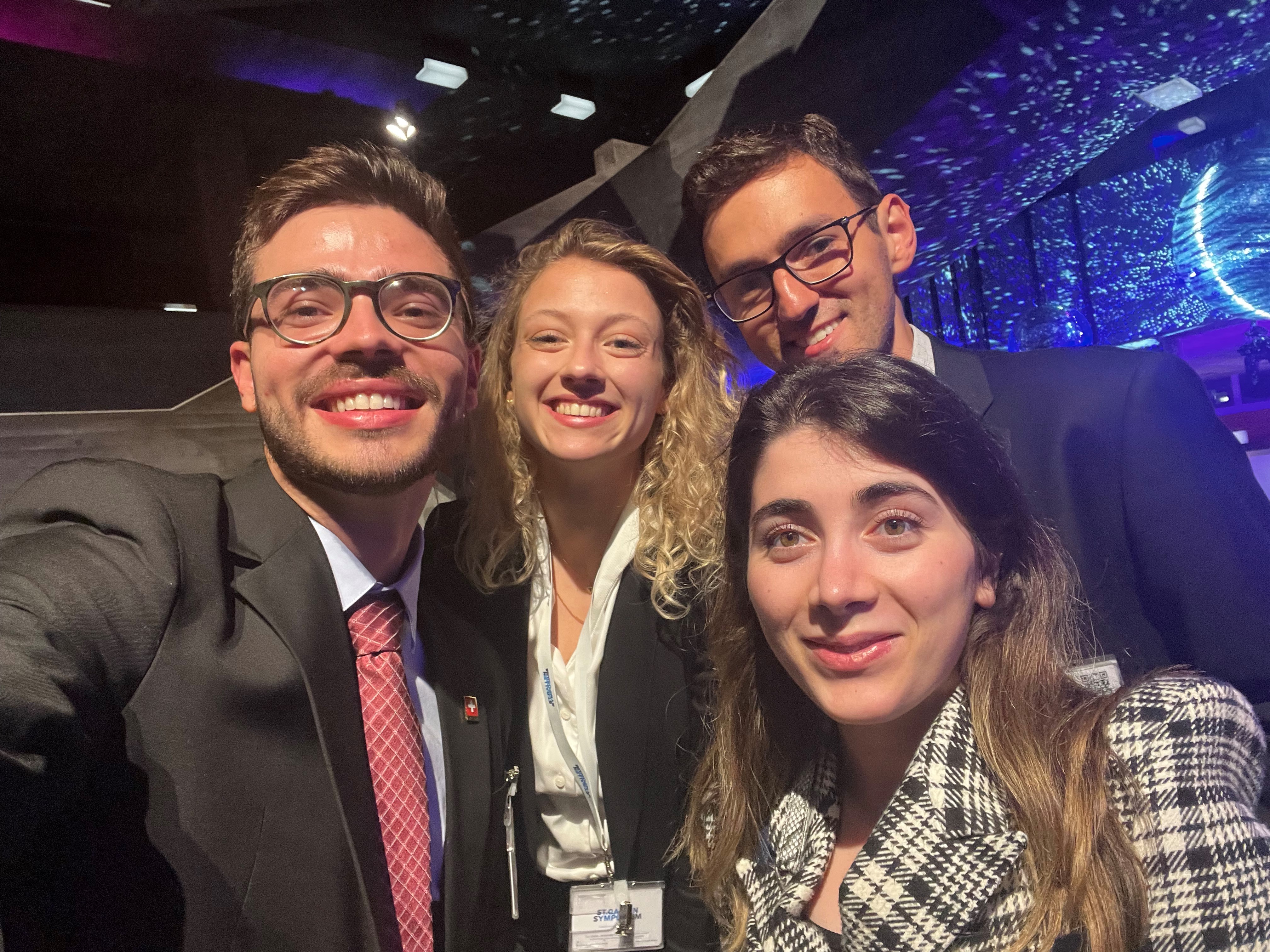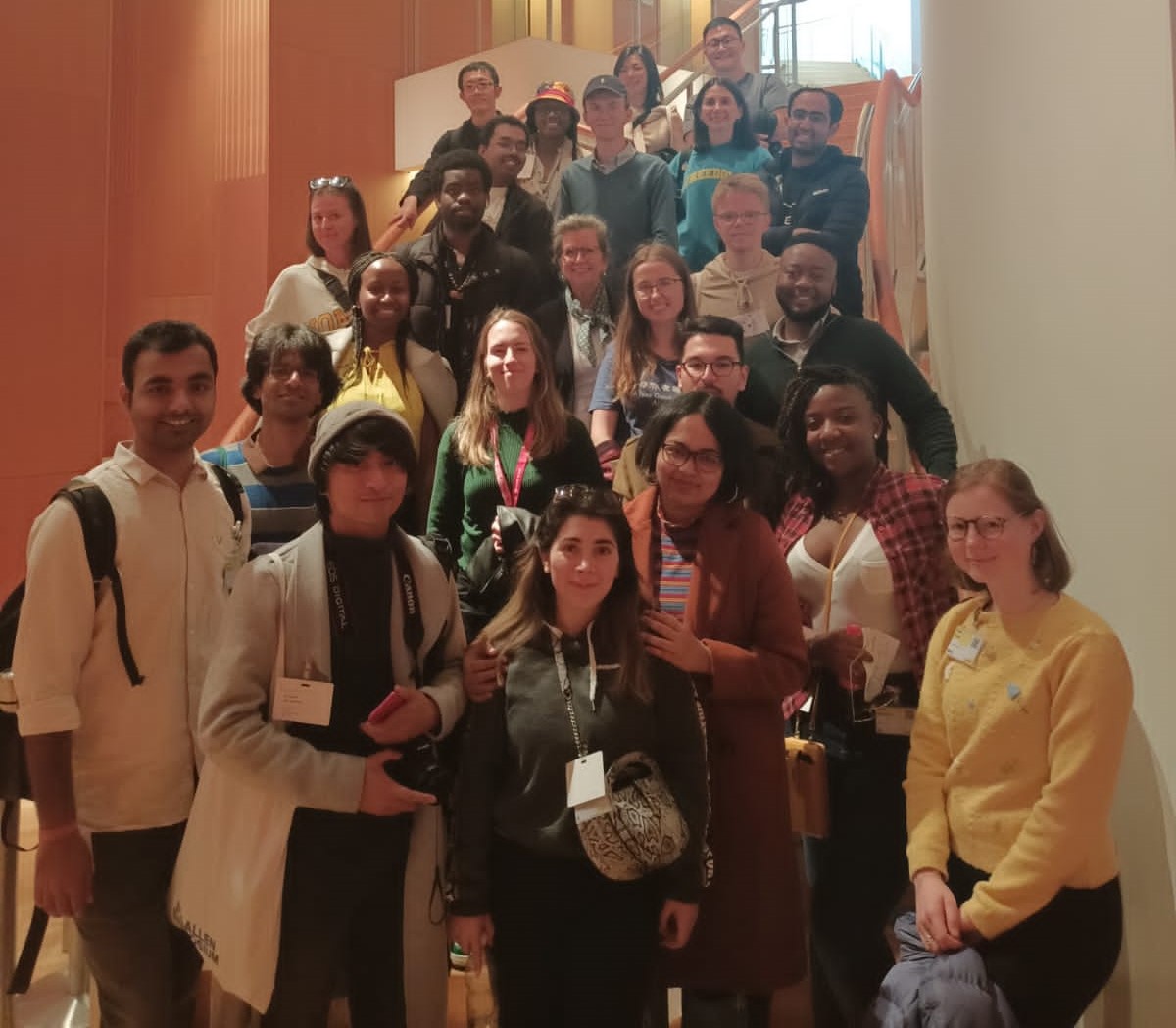Nargiz Mammadova among the Leaders of Tomorrow
Nargiz Mammadova, international student of the Economics: Research Program master program, among finalists of the Global Essay Competition, took part in the symposium in St. Gallen, Switzerland. Theme of 2022 essay and symposium was interaction between generations

“Together Everyone Achieves More - The Generational Contract in the Daf-Galor-Zeira Model”
There are two ways of being selected for the 51st St. Gallen Symposium; one way is being invited by the organizers and the second way is submitting an essay whose analysis should be relevant to the pre-defined topic questions. The topic of this year was Collaborative Advantage: what should be written into a new intergenerational contract? I entitled my corresponding essay as “Together Everyone Achieves More - The Generational Contract in the Daf-Galor-Zeira Model”, which was among top 100 essays out of 400 having been submitted.

In analyzing the function of wealth distribution through an investment in human capital, Galor and Zeira (1993) found out that the primary dissemination of wealth influences output so as investment both in the short and long run given that there is a presence of imperfections pertaining to the credit market and indivisibilities of human capital when it comes to investment. It has been verified that the distribution of wealth predominantly shapes the economic growth. However, there is a limited literature devoted to the role of generational contracts in economics, especially for the overlapping generations. Thus, the main objective of my essay was to extend the Galor-Zeira Model by adding the concept of Generational Contract to ease financial market immobility and contribute to the sustainable welfare state through the burgeon of optimal consumption smoothing.
From the brief review of the prevailing literature, it turns out that the concept of generational contract plays a crucial role in attaining optimal welfare distribution as well as consumption smoothing for the generations to come. In the view of this, there was a need to include generational contract to macroeconomic modelling of welfare and income distribution, which I tried to address in Daf-Galor-Zeira model. The preeminent assumptions of the paper were as follows:
-
First, the assumption of one good should be replaced with the availability of n goods which will provide more flexibility to economic agents to select smooth their consumption
-
Individuals differ in not only the wealth they inherited from their parents or grandparents but also their abilities and preferences that affect their decision of investing in human capital. If the ability of an individual is less than the average level of ability needed for a certain occupation, then their investment in human capital will either be a sunk cost or inefficient. In this case, not all of their descendants will be in the skilled labor force
-
The assumption which states that individuals consume only during the second period of life is not consistent with the reality that there is an autonomous consumption which asseverates that even with 0 income, individuals should consume to satisfy their basic necessities. Thus, I re-new the assumption and claim that c>0 for all periods
-
In terms of having parents, individuals are classified into three groups: those who have two parents, those who have 1 parent, and orphans. When the wealth distribution is considered, it can be postulated that individuals who have parent(s), they are more likely to be in skilled labor force than orphans
-
Production function includes capital (𝐾𝑡), technology (𝐴𝑡), skilled (𝐿𝑡 𝑠) and unskilled labour (𝐿𝑡 𝑢 ), and unpaid work by parents (𝑧𝑡) for their children. Galor-Zeira model bypassed saving rate which plays an indispensable role for the investment in human capital. In Daf-Galor-Zeira model, I will claim that saving smooths consumption more efficiently than the inherited wealth does. Saving can also enable individuals who are not initially endowed with an inherited bequest to buy insurance in the future again for smoothing consumption
-
There is also nothing mentioned about taxes and pension in Galor-Zeira model. I will assume that government can use the tax revenue to make an investment in human capital for individuals who are financially vulnerable. Regarding pensions, the old generation can devote some x% of their pension for the investment in human capital for the individuals who did not inherit wealth from their parents or relatives
-
The Daf-Galor-Zeira model also considers that unpaid work by parents to their children also contribute to the probability of being in a skilled labor force and the amount of unpaid work decays over time as children grow. Unpaid work devoted to children by their parents will be proxied by the amount of time parents spent on children

How Did You Learn about the 51st ST. Gallen Symposium?

During the first year of my Master studies, I had a chance of working with Prof. Veronika Yurevna Belousova who, being aware of my immense interests in research works, always timely informed me about the essay competitions. One day she forwarded me an e-mail of Prof. Fuad Aleskerov who was asked by the organizers of the event to share information about the 51st St. Gallen Symposium and this is how this magnificent journey started.
How will the model work?
Starting with the role of government on the implementation and burgeon of the generational contracts, the certain % of the wage of parent who dies should be transferred to the child if the family belongs to the low or middle-income group. This will increase the chance of a child from poor family to be in the skilled labor force so as his/her descendants. Additionally, the government, by taxing the income of rich families, can transfer some money to children who are orphans or belong to low and middle-income families. In this way, old generation will contribute to the future ones, which will also improve the sustainable welfare state.
To eliminate the financial market immobility, the government can implement two policies and one of them is offering grants to those individuals encountering financial difficulties. The way how a government can do it is through savings of wealthy ones. To be clearer, some portion of this savings will be transferred to orphans or individuals from low and middle-income families.
What is more is that the government can establish mobility programs where the members of the experienced middle-aged and old generation will train talented individuals who have been tested based on their analytical, quantitative, and verbal skills. The similar program has been applied by my country to identify and promote promising people with high management skills and intellectual level. This, in turns, will serve to the purpose of establishing a human resources bank in the country, which will be comprised of promising leaders with high intellectual level and managerial qualities.
What are your expressions about the 51st ST. Gallen Symposium?
First and foremost, I would like to express my myriad gratitude to the dream team of Cosima von Wackerbarth, Livia Mühlheim, Fabio Heini, and Svenja Bossard who forego their entire academic year to organize such a magnificent, unforgettable, inestimable, and once-inlifetime event that I am extremely happy to be a part of. Many thanks to my host Kelsey Maurer for hospitality and devoting her precious time to make her apartment feel like home.
Speaking of contributors, it would be unfair not to mention volunteers who were humble and put themselves to our services for anything we need to ensure that four crazy busy days are smooth for participants. Breathtaking view of St. Gallen, mesmerizing Basel, outstanding Swiss chocolates, heaven of cheese, black and white cute cows, always-smiling and ready-tohelp local people, deep-rooted culture, level of safety, accurateness and timeliness, and Swiss Ice-cream, are only a few that blew my mind during these halcyon days in Switzerland. Words are so weak to convey how proud I am to become an alumnus of the Leaders of Tomorrow Community and get to know amazing people from all walks of life with whom we caught a chance of sharing cultural values. At a short period of time, we managed to create a family of around 200 students for whom geography and distance cannot be a barrier to re-connect again.

Finally, on these positive notes, I would like to thank my very beloved supervisor, Veronika Yurevna Belousova , for EVERYTHING she has done for me since October 2020 until this very moment. Participating in 51st ST. Gallen Symposium is an unforgettable experience being added to my memory and for this, I owe her oceans of appreciation.
